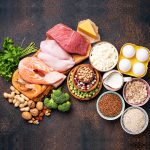We’ve all been there, reaching for chips, chocolate, or that extra serving of dessert after…
Read MoreChia seeds (Salvia hispanica L.) are having a moment in the sun! But they are not a modern food fad by any stretch of imagination. Originally from Mexico and Guatemala, they’ve been used by humans for about fifty five hundred years. Traditionally, they were used by Aztecs and Maya peoples as food and in the preparation of folk medicines. The word “chia” comes from the Spanish word “chian” which means oily. Chia seeds whole and grounded as well as its oil were used in ancient cosmetics and religious rituals in Aztecs communities.[1]Ullah, Rahman, Muhammad Nadeem, Anjum Khalique, Muhammad Imran, Shahid Mehmood, Arshad Javid, and Jibran Hussain. “Nutritional and therapeutic perspectives of Chia (Salvia hispanica L.): a … Continue reading
Chia seeds are not mentioned in ayurvedic texts. However, based on ayurvedic principles we can say that they possess the qualities of sheeta (cold), snigdha (unctuous) and pichilla (slimy or gelatinous).
From an ayurvedic perspective, chia seeds are thought to reduce vata (the air and space element), optimize pitta (the fire element) and nourish kapha (the water and earth elements). They can help improve hydration in all tissues and are also sattvic, or pure, in nature. Sattvic foods are thought to cultivate and promote clarity and equanimity of the mind, while also benefiting the body. Hydrating sattvic foods also encourage ojas (vitality and endurance) which forms the foundation of your immunity.
Can they help with weight management? According to ayurveda foods that have the qualities of being guru (heavy) and atarpana (de- nourishing or fat reducing) are thought to be helpful in weight management. Chia seeds have the quality of being guru since they are sheeta, snigdha and pichilla while their fiber content makes them atarpana. Hence, they may help with weight management.
Some research indicates that having chia seeds does not lead to weight loss.[2]Nieman, David C., Erin J. Cayea, Melanie D. Austin, Dru A. Henson, Steven R. McAnulty, and Fuxia Jin. “Chia seed does not promote weight loss or alter disease risk factors in overweight … Continue reading However, one study that looked at overweight or obese people with type-2 diabetes on a calorie restricted diet found that those who had chia seeds lost more weight and experienced a greater reduction in waist circumference than those who did not.[3]Vuksan, V., A. L. Jenkins, C. Brissette, L. Choleva, E. Jovanovski, A. L. Gibbs, R. P. Bazinet et al. “Salba-chia (Salvia hispanica L.) in the treatment of overweight and obese patients with … Continue reading
So, what does this mean? These studies appear to suggest that while adding chia seeds to your diet might not help you lose weight, they can enhance the weight loss effects of a reduced calorie diet. Meanwhile, animal studies have shown that adding chia seeds to the diet (without changing calorie intake) can reduce abdominal fat even when it does not result in weight loss.[4]Chicco, Adriana G., Maria E. D’Alessandro, Gustavo J. Hein, Maria E. Oliva, and Yolanda B. Lombardo. “Dietary chia seed (Salvia hispanica L.) rich in α-linolenic acid improves adiposity … Continue reading
The main reason why chia seeds help with weight loss appears to be its high fiber content. When water is added to them, they swell up – they can absorb about 12 times their weight – and become gel-like. They mix with your gastric juices and water in your stomach and expand. This means you feel fuller for a longer time. Soluble fiber also slows down digestion. Therefore, blood sugar is released at a slower rater by your body warding off sugar spikes that can lead to increased appetite.[5][Can Drinking Chia Water Help You Lose Weight?].Cleveland Clinic.[6][Soluble vs. insoluble fiber].U.S. National Library of Medicine.
Chia seeds provide us with a range of nutrients. They are:
Chia seeds are a good source of minerals like calcium and iron. They also provide a good dose of zinc and magnesium.
One ounce of chia seeds will give you 8.7 grams of fat. Around 60% of that is omega-3 fatty acids. These healthy fats are considered good for your heart as they can help regulate heart rhythms, prevent blood clots, and reduce cholesterol and inflammation.
An ounce of chia seeds will give you about 10 grams of fiber. A diet rich in fiber is linked to a lower risk of conditions such as heart disease, type-2 diabetes, and stroke.[7][How to get more fibre into your diet].NHS,UK.
Chia seeds contain all 9 essential amino acids that need to be obtained from food as they cannot be made by the human body. This makes them a complete protein unlike most plant sources of protein. One ounce of chia seeds will give you 4.7 grams of protein.[8][Chia Seed Nutrition Facts and Health Benefits].Verywell Fit.
Chia seeds can help reduce blood sugar spikes post meals. Therefore they can be useful for people suffering from diabetes.[9]Mihafu, Fabian Dominicus, Beatrice Nyanchama Kiage, Andrew Nyerere Kimang’a, and Judith Kanensi Okoth. “Effect of chia seeds (Salvia hispanica) on postprandial glycaemia, body weight and … Continue reading
Chia seeds can lower LDL or “bad” cholesterol and increase HDL or “good” cholesterol. It can also reduce triglycerides.[10]Ullah, Rahman, Muhammad Nadeem, Anjum Khalique, Muhammad Imran, Shahid Mehmood, Arshad Javid, and Jibran Hussain. “Nutritional and therapeutic perspectives of Chia (Salvia hispanica L.): a … Continue reading High levels of both LDL cholesterol and triglycerides (a fatty substance much like LDL cholesterol) can increase your risk for heart problems and strokes. So chia seeds might help keep your heart healthy.[11][Cholesterol levels].NHS,uk.
Over time, high blood pressure can lead to serious health issues such as heart failure, heart attack, kidney failure, and stroke.[12][High Blood Pressure](https://medlineplus.gov/highbloodpressure.html “High Blood Pressure”). U.S. National Library of Medicine. But chia seeds can be helpful in managing this condition as they have been found to reduce systolic blood pressure.[13]Alwosais, Eman Zaid Marzouq, Ebaa Al-Ozairi, Tasleem A. Zafar, and Sharifa Alkandari. “Chia seed (Salvia hispanica L.) supplementation to the diet of adults with type 2 diabetes improved … Continue reading
Chia seeds contain both soluble and insoluble fiber. This means that it can add bulk to your stool and also soften it. This makes it faster and easier to pass and can help ease constipation.[14][Chia Seed Nutrition Facts and Health Benefits].Verywell Fit.
Chia seeds contain beneficial compounds such as quercetin and kaempferol. These compounds have anti-cancer properties and may help fight many different kinds of cancer such as colon cancer, breast cancer, liver cancer etc.[15][Chia Seed Nutrition Facts and Health Benefits].Verywell Fit.
Experts recommend 1 serving of chia seeds which is 2 tablespoons or 1 ounce.[16][Chia Seeds for Health: The Tiny Superfood?]. International Food Information Council.This will give you around 8.7 grams of fat and 10 grams of fiber.
Don’t eat chia seeds dry. They may expand in your food pipe and cause a blockage. Soak them in some liquid or have them with foods containing fluids. The surface of these seeds easily breaks down in the presence of moisture making it easier to digest. Moreover, they can swell up and block your food pipe if they are consumed dry.
In order to lose weight, you need to burn more calories than you consume. You can do this by:
A: Include chia seeds in a reduced calorie diet to increase the effectiveness of the diet. Add them to liquid foods like smoothies, oats, yogurt, soups, etc.
A: Yes, research indicates that including chia seeds in a reduced calorie diet can lead to greater loss of abdominal fat. In fact, animal studies have found that having chia seeds can lead to loss of belly fat even when body weight remains virtually constant.
A: While including chia seeds in a reduced calorie diet can help boost weight loss, they should not be your primary means of losing weight. A healthy, balanced reduced calorie diet combined with exercise remains the best way of losing weight. One serving of chia seeds for an adult is 2 tablespoons.
References
| ↑1 | Ullah, Rahman, Muhammad Nadeem, Anjum Khalique, Muhammad Imran, Shahid Mehmood, Arshad Javid, and Jibran Hussain. “Nutritional and therapeutic perspectives of Chia (Salvia hispanica L.): a review.” Journal of food science and technology 53, no. 4 (2016): 1750-1758. |
|---|---|
| ↑2 | Nieman, David C., Erin J. Cayea, Melanie D. Austin, Dru A. Henson, Steven R. McAnulty, and Fuxia Jin. “Chia seed does not promote weight loss or alter disease risk factors in overweight adults.” Nutrition Research 29, no. 6 (2009): 414-418. |
| ↑3 | Vuksan, V., A. L. Jenkins, C. Brissette, L. Choleva, E. Jovanovski, A. L. Gibbs, R. P. Bazinet et al. “Salba-chia (Salvia hispanica L.) in the treatment of overweight and obese patients with type 2 diabetes: A double-blind randomized controlled trial.” Nutrition, Metabolism and Cardiovascular Diseases 27, no. 2 (2017): 138-146. |
| ↑4 | Chicco, Adriana G., Maria E. D’Alessandro, Gustavo J. Hein, Maria E. Oliva, and Yolanda B. Lombardo. “Dietary chia seed (Salvia hispanica L.) rich in α-linolenic acid improves adiposity and normalises hypertriacylglycerolaemia and insulin resistance in dyslipaemic rats.” British journal of nutrition 101, no. 1 (2008): 41-50. |
| ↑5 | [Can Drinking Chia Water Help You Lose Weight?].Cleveland Clinic. |
| ↑6 | [Soluble vs. insoluble fiber].U.S. National Library of Medicine. |
| ↑7 | [How to get more fibre into your diet].NHS,UK. |
| ↑8, ↑14, ↑15 | [Chia Seed Nutrition Facts and Health Benefits].Verywell Fit. |
| ↑9 | Mihafu, Fabian Dominicus, Beatrice Nyanchama Kiage, Andrew Nyerere Kimang’a, and Judith Kanensi Okoth. “Effect of chia seeds (Salvia hispanica) on postprandial glycaemia, body weight and hematological parameters in rats fed a high fat and fructose diet.” International Journal of Biological and Chemical Sciences 14, no. 5 (2020): 1752-1762. |
| ↑10 | Ullah, Rahman, Muhammad Nadeem, Anjum Khalique, Muhammad Imran, Shahid Mehmood, Arshad Javid, and Jibran Hussain. “Nutritional and therapeutic perspectives of Chia (Salvia hispanica L.): a review.” Journal of food science and technology 53, no. 4 (2016): 1750-1758. |
| ↑11 | [Cholesterol levels].NHS,uk. |
| ↑12 | [High Blood Pressure](https://medlineplus.gov/highbloodpressure.html “High Blood Pressure”). U.S. National Library of Medicine. |
| ↑13 | Alwosais, Eman Zaid Marzouq, Ebaa Al-Ozairi, Tasleem A. Zafar, and Sharifa Alkandari. “Chia seed (Salvia hispanica L.) supplementation to the diet of adults with type 2 diabetes improved systolic blood pressure: A randomized controlled trial.” Nutrition and Health 27, no. 2 (2021): 181-189. |
| ↑16 | [Chia Seeds for Health: The Tiny Superfood?]. International Food Information Council. |
| ↑17, ↑18 | [Chia Seeds].Harvard T.H. Chan School of Public Health. |
| ↑19 | [Weight Control].U.S. National Library of Medicine. |
| ↑20 | [Exercise].NHS,UK. |


Dr. Manjula has 12 years of experience in the field of Ayurveda and worked as a Consultant and General Physician for over 5 years before starting her private practice. In addition to BAMS, she also has an Advanced Diploma in Clinical Research and is trained in Panchkarma. She is an expert at diagnosis of the root cause and planning effective treatment for multiple issues.

We’ve all been there, reaching for chips, chocolate, or that extra serving of dessert after…
Read More
We know how difficult and tiresome a weight loss journey can sound, but it need…
Read More
The key to healthy weight loss is achieving a negative energy balance or taking in…
Read More
Thanks for choosing Kapiva! Ayurveda is about balance, the same translates to its view on…
Read More